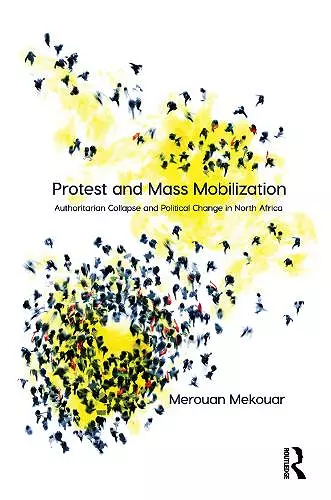Protest and Mass Mobilization
Authoritarian Collapse and Political Change in North Africa
Format:Hardback
Publisher:Taylor & Francis Ltd
Published:11th Mar '16
Currently unavailable, our supplier has not provided us a restock date
This hardback is available in another edition too:
- Paperback£41.99was £41.99(9780367596965)

Why and how do some acts of protest trigger mass mobilization while others do not? Using the cases of Morocco, Algeria, Tunisia, and Libya, Mekouar argues that successful mass mobilization is the result of a surprise factor, whose impact and exceptionality is amplified by the presence of influential political agents during the early phase of protest, as well as by regime violence and unusual media coverage. Together this study argues that these factors create a perception of exceptionality, which breaks the locally available cognitive heuristic originally in favor of the regime, and thus creates the necessary conditions for mobilization to occur. This book provides a unique dialectical picture of mobilization in North Africa by focusing both on the perspective of those who mobilized against their local regimes and members of the security forces who were responsible for stopping them. Moreover, it offers a first-hand account of the tumultuous days preceding authoritarian collapse and explains the mechanisms through which political change occurs.
This context-sensitive monograph is a great contribution to the literature on social mobilization in the largely understudied Maghreb region. It provides a unique examination of the dialectical process of social mobilization and state repression based on interviews with activists and members of the security services. Definitely a must read book.
Osire Glacier, Bishop’s University, Canada
Mekouar’s theoretically unique and narratively rich book is a required-read for students of the Middle East and practitioners who want to understand how the regimes, the opposition movements and ordinary citizens reacted in a way that stimulated or failed mobilization in Tunisia, Libya, Algeria and Morocco. Any MENA or social movement syllabus must include this work for a better understanding of the Arab Uprisings and its continuing legacies on the region.
Ekrem Karakoç, Binghamton University, SUNY, USA
Merouan Mekouar tackles a central question not yet answered by the vast literature on the Arab uprisings: why do some small acts of protest spark revolutionary mobilization while others do not? By examining successful as well as failed mobilizations, he develops an original approach that brings process-tracing models into dialogue with theories of information cascades. A must-read for those interested in the origins and timing of the Arab uprisings and revolutions in general.
Jillian Schwedler, City University of New York, USA
ISBN: 9781472459305
Dimensions: unknown
Weight: 490g
180 pages